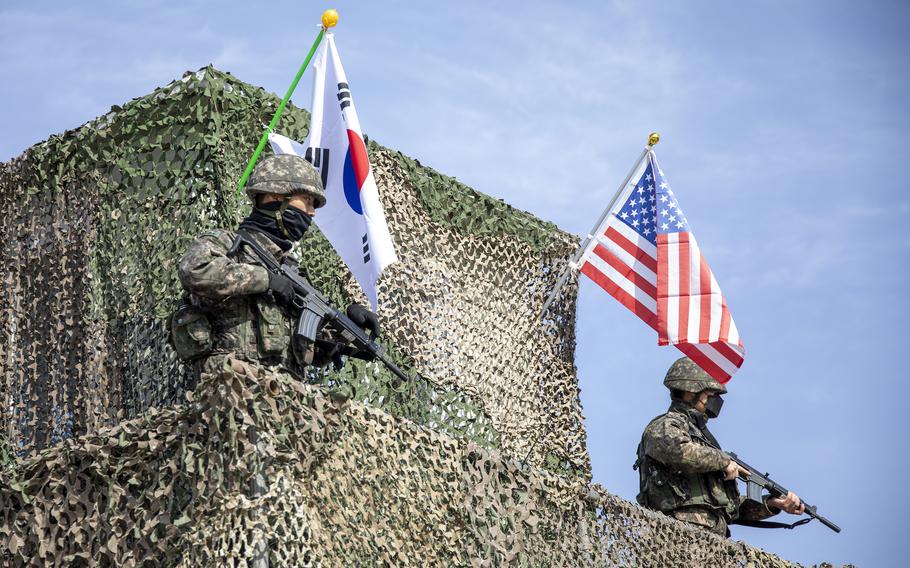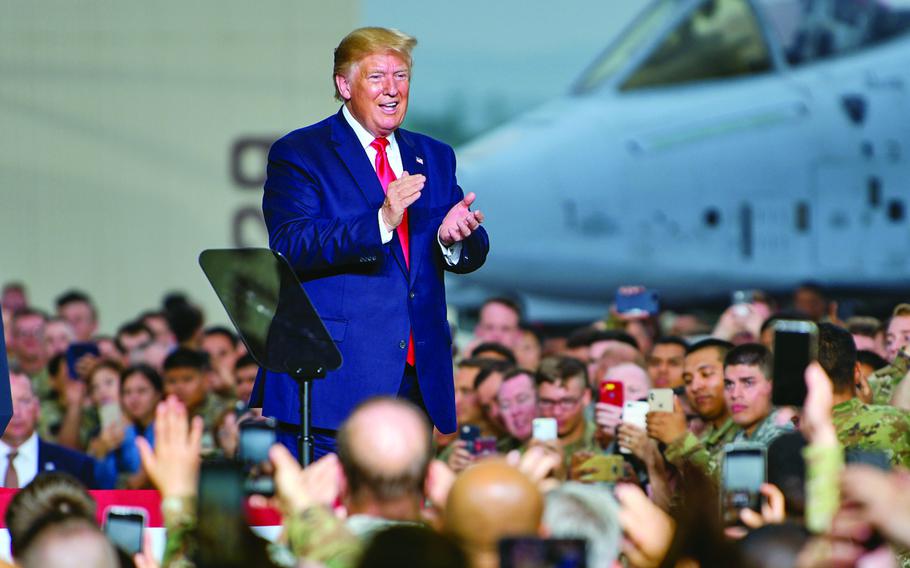
South Korean soldiers keep watch during a Freedom Shield drill in Dongducheon, South Korea, on March 13, 2025. (Jameson Harris/U.S. Army)
The Trump administration will face credibility issues if it attempts, following the imposition of a 10% tariff on South Korea, to renegotiate the cost of stationing U.S. troops there, according to policy experts.
President Donald Trump proposed a streamlined, “one-stop shopping” deal on defense and trade after a 30-minute call on April 8 with acting South Korean President Han Duck-soo, according to a Truth Social post from Trump that day.
But any attempt to renegotiate the defense spending agreement reached in November is premature until South Korea elects a permanent replacement for former President Yoon Suk Yeol in June, said Hwang Jihwan, a University of Seoul professor of international relations, by phone Friday.
Yoon, impeached in December over his failed attempt to impose martial law, was formally removed from office on April 4 by the South Korean Constitutional Court.
The five-year Special Measures Agreement negotiated under former President Joe Biden set South Korea’s support for U.S. troops and bases at $1.2 billion annually starting in 2026, a $200 million increase over the current agreement.
Further complicating their relationship, the U.S. imposed a 25% tariff on South Korea, later reduced to 10%, as part of Trump’s fluctuating global tariffs unveiled on April 2.
“Realistically, it is hard for the decision makers to sign a package deal,” Hwang said. “We are currently struggling just talking about tariffs and that is what they are focused on. The people who are negotiating the tariffs do not have the authorization over defense spending.”

President Donald Trump speaks with service members at Osan Air Base, South Korea, in June 2019. (Stars and Stripes)
South Korean exports to the U.S. thus far in April have fallen 5.2%, a decline of roughly $2 billion, over the same period last year, according to a Korea Customs Service news release Monday.
Trump may want to renegotiate the Special Measures Agreement, separately or as part of a trade package, as soon as possible, Lee Byong-Chul, a Far Eastern studies researcher at Kyungnam University in South Korea, said by phone Thursday.
“If [the amount] gets close to what Trump mentioned, it will be a worst-case scenario,” he said. “If we lower it much less than he expected, just a tiny increase from [Biden’s agreement], it would be a successful deal.”
During his first term, Trump demanded a 400% increase in the agreement, from less than $1 billion to $5 billion annually. He left office in 2021 with the negotiations unresolved and repeatedly misrepresented the provisional one-year agreement during his term and the five-year deal reached later under Biden.
Through the Special Measures Agreement, South Korea offsets the cost to station 28,500 U.S. troops throughout the country as a hedge against a conflict with North Korea. The money pays for construction projects on U.S. bases and the salaries of Korean employees working for U.S. Forces Korea.
Attaching a price tag to the 75-year U.S.-South Korea alliance or imposing a significant hike in Seoul’s contribution could cause a rift in their relations, both Lee and Hwang said.
“Of course, we need to maintain a secure alliance,” Hwang said. “But in this case, credibility issues might be created.”
If the two countries agree on a reasonable amount, “there would be a minimal effect” on the alliance, Lee said.
“But if it becomes too biased … it would have a huge negative impact,” Lee said. “If both sides only emphasize their own benefits, it would be a burden for our governments.”